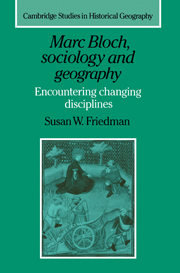Book contents
- Frontmatter
- Contents
- List of tables
- Acknowledgments
- A note on translation
- List of abbreviations
- Introduction
- 1 Marc Bloch and the “Université”
- PART I Sociology, geography, and history during Marc Bloch's years of apprenticeship
- PART II Marc Bloch as a critic and practitioner of sociology and geography
- Notes
- Index of names
- Subject index
- Cambridge Studies in Historical Geography
1 - Marc Bloch and the “Université”
Published online by Cambridge University Press: 23 November 2009
- Frontmatter
- Contents
- List of tables
- Acknowledgments
- A note on translation
- List of abbreviations
- Introduction
- 1 Marc Bloch and the “Université”
- PART I Sociology, geography, and history during Marc Bloch's years of apprenticeship
- PART II Marc Bloch as a critic and practitioner of sociology and geography
- Notes
- Index of names
- Subject index
- Cambridge Studies in Historical Geography
Summary
Marc Bloch was a child, member, and critic of the French “Université.” This unique and highly centralized state corporation, dating from Napoleon, included teaching posts from the primary to post-graduate levels, state-run inspections, teaching evaluations, examinations, and degrees. Born into an intensely academic family at the summit of the Université, Bloch attended its most prestigious institutions. Within its bounds, he grappled with questions of disciplinary development, methodology, and limits, including, for him, the central questions of the possible relationships between history, geography, and sociology. Increasingly, as his career advanced, he openly criticized its institutional structures which he found so confining and counterproductive. In brief, the Université provided the framework for both his life and his work, setting limits, charting obligatory paths, and providing the structures which he and others sought to change.
The seats of power in the Université were in Paris, and it was there that Marc Bloch spent his formative years. His father, Gustave Bloch, was appointed to the post of maître de conférences at the Ecole Normale Supérieure in 1887, the year after Marc's birth in Lyon. With the exception of two years away for military service and a year of study in Germany, he stayed in Paris until the age of 27 when he began his first position teaching in a provincial lycée.
- Type
- Chapter
- Information
- Marc Bloch, Sociology and GeographyEncountering Changing Disciplines, pp. 5 - 18Publisher: Cambridge University PressPrint publication year: 1996



